LinuxLive USB creator now supports Peppermint OS Three, ArchLinux and Slitaz
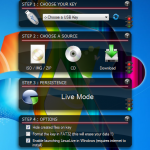
Linux is no longer the geeky OS it used to be. Well, that might not be entirely true, but the operating system certainly has become more accessible in recent years. User friendly distributions such as Ubuntu have increased the popularity of Linux, but making the switch from Windows is still rather a daunting task for most people. If you don’t fancy the idea of wiping out Windows completely, or even going down the dual-boot route, LinuxLive USB Creator lets you make a portable version that can be run from a USB drive.
The very latest version of the program has added support for Peppermint OS Three, ArchLinux and Slitaz, but there are countless other distributions that can be used. Turning your USB drive into a portable Linux drive could hardly be simpler. If you have already download a Linux image, or you already have a distro burned to disc, you can select either of these as a source. However, you are also able to download many different varieties of Linux from within the app.
Will Windows 8 make Linux the new gaming OS?

Windows 8 gets grief from all angles, including from the gaming industry. Valve’s boss Gabe Newell recently called the forthcoming OS "a catastrophe for everyone in the PC space", and Blizzard's Executive vice president of Game Design, Rob Pardo, tweets that Windows 8 "was not awesome for Blizzard either".
There are a couple of reasons why Gabe Newell, who worked at Microsoft for 13 years before leaving to form Valve, doesn’t like the new operating system. The awkwardness of running games through the interface formerly known as Metro is the most obvious issue, but the integrated Windows Store, which will directly compete with Valve’s distribution service Steam, is a much bigger concern for the company.
Linux fans rejoice: Dell XPS 13 will come with Ubuntu

Dell must have read my story on “What will it take to make Linux popular?”, agreed with Linus Torvalds' initial thoughts, then thought that it might be a good idea to publicly announce “Project Sputnik”, which despite the name doesn’t have anything to do with spacecraft like Dell would want you to believe. (Okay, so the skunkworks project predates my story by six months, but surely official timing can't be a coincidence?)
What Project Sputnik does is bring “an official developer laptop based on the Dell XPS 13 with Ubuntu 12.04 LTS preloaded, available in select geographies”, meaning Linux for the people on the Dell XPS 13 in much simpler words. Dell is taking the project to the next level by officially releasing it this fall. Timing is interesting with Windows 8 launching October 26. Since the laptop comes with Linux, presumably it will cost less than its counterpart running Windows.
Jumpshot: the Linux security stick you give to your clueless friends

With slick marketing, a great sense of humor, and a practical, useful product idea, Texas startup Jumpshot launched its initial public funding round on Kickstarter this week.
The long and short of Jumpshot is that it's a USB stick that removes bloatware, adware, spyware, and malware in a package that toddlers and grannies alike would be able to use. When Jumpshot is cleaning the system in the background, the user can stay connected and browse the Web in a Linux-based sandbox.
What will it take to make Linux popular?

In a recent interview Linus Torvalds, the mastermind behind the Linux kernel, said that the operating system is not as popular as Windows on consumer PCs because it doesn’t come preinstalled. Manufacturers sell the computers they make with an operating system on board, which most of the time is Windows. Why can’t it be Linux instead?
According to Net Applications, in 2011, sales estimates have Linux at roughly 1.5 percent usage share on desktop and laptop computers. Windows on the other hand was evaluated at 92 percent in the same estimate. The discrepancy in sales points out few of the issues that Linux has to overcome in order to reach a broader market adoption, but it can also provide a solution.
As Red Hat Enterprise Linux turns 10, focus shifts to the cloud

Red Hat celebrated the 10th anniversary of its flagship Enterprise Linux product, but reaffirmed the decision to shift focus to cloud computing, pledging that open-source roots would be key to success in the new business venture.
The company plans to release Enterprise Linux 7 in in late 2013, but offered little during a Tuesday press conference on what to expect. What may play a large part in the new release is a focus on the cloud. For all intents and purposes, Red Hat believes Linux is in the past and the cloud is the future.
Linux Live USB Creator isn't another 'me-too' utility
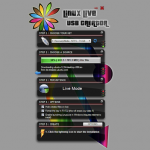
At first glance Linux Live USB Creator looks much like UNetbootin, theUniversal USB Installer, and every other tool that aims to help you download and create a bootable Linux environment for your PC. And as those existing tools are generally very good it’s not immediately obvious why we might need another.
Take a closer look at the Linux Live USB Creator and you’ll see it’s not just another “me too” utility, though -- the program really does have enough features and functionality to stand up against the best of the rest.
Red Hat: Open source's first billion dollar company
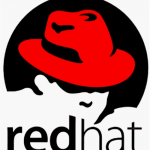
Shares of Red Hat rose 17 percent to $60.12 in heavy midday trading. Yesterday, after the bell, the company reported $1.13 billion revenues for fiscal 2012, ended February 29. Red Hat is the first open-source based company to post $1 billion in revenues
Quite a feat for a platform Microsoft CEO Steve Ballmer once called a "cancer" and has repeatedly questioned the security of. One has to wonder if Ballmer might be reconsidering the parnership Microsoft penned with Red Hat back in February 2009.
Universal USB Installer supports four more Linux distros

The busy folks at Pen Drive Linux have updated their handy Universal USB Installer tool to support four more distros. Which means it can now convert live CDs of Deepin Linux, LinHES Linux, Trisquel Linux and Satux Linux to run on USB keys.
And that’s not bad at all, as the tool already supported all the usual big name distros (Ubuntu, Debian, Fedora, OpenSUSE and more, each in multiple versions), as well as a lengthy list of Linux-based utilities: Gparted, System Rescue CD, and antivirus rescue CDs from AVG, Avira, BitDefender, F-Secure and Kaspersky, amongst others.
Tiny, sugary sweet Linux PCs get eaten up
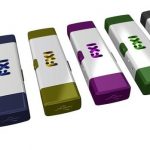
Make it small, make it cheap, and people will buy it.
Two tiny, single-board Linux computers with sweet names that debuted at nearly the same time have attracted disproportionately large attention from PC consumers this week: the Raspberry Pi, and the FXI Cotton Candy. The Raspberry Pi is a bare, uncased board that costs $35, and the Cotton Candy is a finished, ready to run PC-in-a-USB stick that costs $199. Both sport ARM processors, both will run Linux variants.
Get Linux lets you find and download more than 100 distros

If you want to download a particular Linux distribution you could go online, run a quick search or two, and you’ll probably turn up the necessary links fairly quickly. But a portable Windows tool called Get Linux aims to offer an even simpler solution.
Launch this small program and you’ll see a list of more than 100 Linux distros. Enter the name you need in the Search box, choose whether you’d like the 32 or 64-bit build, click Download, then just wait while Get Linux grabs the necessary ISO for you.
Linaro brings Ice Cream Sandwich & Oneiric Ocelot together on ARM boards

Open-source software engineering group Linaro has pushed out a build of Android Ice Cream Sandwich for low-cost development boards from Samsung and ST-Ericsson. The build supports hardware acceleration for Systems on a Chip utililzing ARM's Mali-400 graphics processor.
Linaro is a year-old nonprofit group that focuses on optimizing open-source software for the ARM architecture; and besides ARM, its due-paying members include Freescale, IBM, Samsung, ST-Ericsson, and Texas Instruments. It creates ARM hardware-optimized middleware upon which developers and OEMs can build their own Android or Ubuntu distributions.
Ubuntu will be on Tablets, Smartphones, TVs

Popular Linux distribution Ubuntu will be coming to tablets, smartphones, and smart TVs, Canonical Inc. founder Mark Shuttleworth said on Monday.
Though the introduction of a "mobile" Ubuntu has no timeline and isn't expected any time soon (Shuttleworth said it will be available by 14.04 LTS), the announcement of this new version is part of a continuing push to bring the Linux distro into the mainstream.
MimoPlug: The touchscreen is a feature, not the main driver
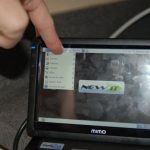
REVIEW: To me, plug computers are exciting because they can perform low-to-mid-level computational functions at an extremely low overall energy cost. They are sort of like fanless PC's of the smallest order...General purpose computers that have the small physical and ecological footprints of embedded systems without the usage case limitations.
A couple of months ago, the people at Mimo Monitors released a bundle called MimoPlug that combined a touchscreen version of their famous USB mini-monitor with an equally miniature plug computer based upon Marvell's SheevaPlug platform that booted Debian off of an included SD card.
© 1998-2025 BetaNews, Inc. All Rights Reserved. Privacy Policy - Cookie Policy.